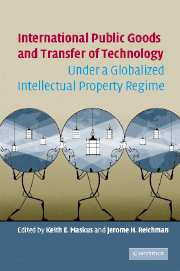Book contents
- Frontmatter
- Contents
- List of contributors
- Preface
- PART I International Provision of Public Goods under a Globalized Intellectual Property Regime
- PART II Innovation and Technology Transfer in a Protectionist Environment
- PART III Sectoral Issues: Essential Medicines and Traditional Knowledge
- 15 Managing the Hydra: The Herculean Task of Ensuring Access to Essential Medicines
- 16 Theory and Implementation of Differential Pricing for Pharmaceuticals
- 17 Increasing R&D Incentives for Neglected Diseases: Lessons from the Orphan Drug Act
- Comment: Access to Essential Medicines – Promoting Human Rights Over Free Trade and Intellectual Property Claims
- 18 Legal and Economic Aspects of Traditional Knowledge
- 19 Saving the Village: Conserving Jurisprudential Diversity in the International Protection of Traditional Knowledge
- 20 Legal Perspectives on Traditional Knowledge: The Case for Intellectual Property Protection
- Comment: Traditional Knowledge, Folklore and the Case for Benign Neglect
- 21 Protecting Cultural Industries to Promote Cultural Diversity: Dilemmas for International Policymaking Posed by the Recognition of Traditional Knowledge
- PART IV Reform and Regulation Issues
- Index
Comment: Traditional Knowledge, Folklore and the Case for Benign Neglect
Published online by Cambridge University Press: 05 May 2010
- Frontmatter
- Contents
- List of contributors
- Preface
- PART I International Provision of Public Goods under a Globalized Intellectual Property Regime
- PART II Innovation and Technology Transfer in a Protectionist Environment
- PART III Sectoral Issues: Essential Medicines and Traditional Knowledge
- 15 Managing the Hydra: The Herculean Task of Ensuring Access to Essential Medicines
- 16 Theory and Implementation of Differential Pricing for Pharmaceuticals
- 17 Increasing R&D Incentives for Neglected Diseases: Lessons from the Orphan Drug Act
- Comment: Access to Essential Medicines – Promoting Human Rights Over Free Trade and Intellectual Property Claims
- 18 Legal and Economic Aspects of Traditional Knowledge
- 19 Saving the Village: Conserving Jurisprudential Diversity in the International Protection of Traditional Knowledge
- 20 Legal Perspectives on Traditional Knowledge: The Case for Intellectual Property Protection
- Comment: Traditional Knowledge, Folklore and the Case for Benign Neglect
- 21 Protecting Cultural Industries to Promote Cultural Diversity: Dilemmas for International Policymaking Posed by the Recognition of Traditional Knowledge
- PART IV Reform and Regulation Issues
- Index
Summary
Let us think about folklore a bit more closely.
At the very northeasternmost corner of Vietnam, hard by the China Sea, some sixty statute miles above Haiphong and Hanoi, just below the border where the Chinese mainland begins, lies a secluded bay, its waters clear and deep and emerald in color, a place of magic and surreal beauty, called Ha Long. The Vietnamese say this is the birth place of their country and their people. Their folklore abounds with stories about Ha Long Bay, none more beautiful than this story, which I shall share with you:
In the dawn of time, when magic creatures lived upon the earth, and some men were free and others not, a great dragon came down from the north, bearing a people and their destiny in its mouth, a people rescued by the dragon from enslavement, whom it now sheltered safely among its many sharp and fearsome teeth. But the day was hot, and the dragon was exhausted after its long journey. When at last it came to the place called Ha Long, it could go no farther. Slowly, as the sun was setting, the dragon allowed itself to sink into the brilliant green waters of the bay – so cool, so inviting – until at last nothing could be seen except the sharp scales along its back which jutted above the waters as if they were thousands of islets made of karst or extruded limestone, rather than, as in fact they were, evidence of the miracle of creation that marked this bay as a sacred place. […]
- Type
- Chapter
- Information
- International Public Goods and Transfer of Technology Under a Globalized Intellectual Property Regime , pp. 595 - 598Publisher: Cambridge University PressPrint publication year: 2005



